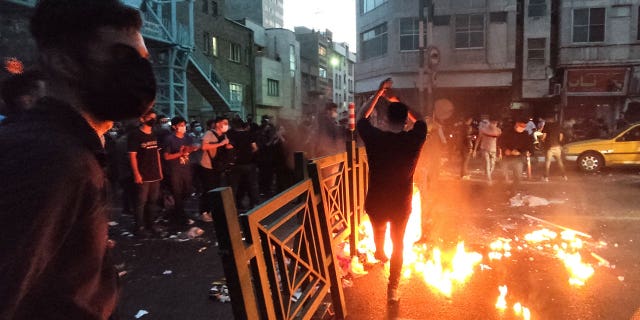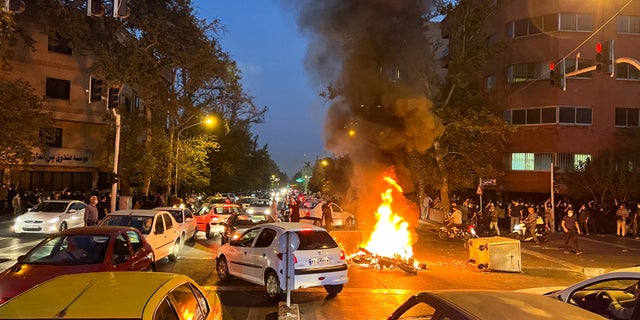Work stoppages hit the Islamic Republic of Iran’s critical energy sector on Monday in the oil-rich province of Bushehr on the Persian Gulf.
Dramatic video footage circulating on social media showed contract workers in the city of Asalouyeh chanting, “Down with the dictator,” in a reference to Supreme Leader of Iran Ali Khamenei, who has not hesitated to order his security forces to mow down peaceful protestors with live ammunition.
“Labor strikes have the potential to cripple the Islamic Republic, particularly in the energy sector. After three weeks of revolution, mass walkouts in the oil, gas and the petrochemical sector pose a serious existential threat to the regime,” Iran expert Alireza Nader told Fox News Digital.
Nader, who has written extensively on the labor unions and worker unrest as a vehicle for ousting the clerical regime, added that the U.S. and other Western nations should “Set up a strike fund to help workers and their families.”
STATE DEPARTMENT MADE ‘CALCULATION’ TO PRIORITIZE IRAN NUCLEAR DEAL OVER HUMAN RIGHTS ISSUES
A security guard stands at his station at the Persian Gulf Star Co. gas condensate refinery in Bandar Abbas, Iran. (Ali Mohammadi/Bloomberg via Getty Images)
The London-based news organization Iran International provided links to the Twitter accounts disclosing video footage of workers declaring, “This year is the year of blood, Seyed Ali Khamenei is done!”
The labor unrest in Iran’s energy industry was triggered by the Islamic Republic of Iran’s morality police who allegedly beat and murdered the 22-year-old Mahsa Amini for violating the nation’s strict law requiring women to cover the hair.
Amini’s death last month has plunged Iran into revolts across the vast Middle East nation.
Workers also protested in Abadan in the Khuzestan Province, which is one of Iran’s most expansive oil and petrochemical hubs.
According to the U.S.-based Center for Human Rights in Iran, the Contractual Oil Workers Protest Organizing Council wrote on its Telegram channel: “To [all] our colleagues in oil, gas and petrochemical projects, in all refineries and petrochemicals; in the oil platforms as well as the drilling sites, we declare that now is the time for widespread protests and to prepare ourselves for nationwide and back-breaking strikes.”
FEMALE STUDENTS SHOUT AT IRANIAN PRESIDENT TO ‘GET LOST’ AS HE CONDEMNS PROTESTS
The workers added, “This is the beginning of the road, and we will continue our protests together with the entire nation day after day.”

People light a fire during a Sept. 21, 2022, protest in Tehran, Iran, over the death of Mahsa Amini, a young Iranian woman who died after being arrested by the nation’s “morality police.”
(West Asia News Agency via Reuters)
The Iranian regime-controlled Tasnim News Agency claimed that labor actions were related to a wage dispute covering 700 workers. The Islamic Republic did not explicitly acknowledge strike activity.
The disruptions of Iran’s energy sector is the first instance of labor disruptions in the energy field due to the death of Amini.
According to human rights groups, the clerical regime has killed 185 people, including 19 minors, since the outbreak of demonstrations more than three weeks ago.
Iranian authorities say “rioters” killed at least 20 security force agents.
Labor and social unrest has been largely limited to universities, where at least 10 universities conducted strikes since the death of Amini. In late September, the Coordinating Council of Cultural Associations urged teachers and students to strike.
Iran International on Saturday reported that the traditional Grand Bazaar in Tehran closed and small businesses and retail workers joined the demonstrations against Khamenei’s regime.
The newly erupted industrial and labor disruptions in Iran’s energy comes at a time when the Biden administration energetically seeks to conclude a nuclear deal with Tehran’s rulers. The so-called Joint Comprehensive Plan of Action (JCPOA), the formal name for the Iran atomic accord, would pump $275 billion into Iran’s coffers during the first year of the agreement, according to a study conducted by the Foundation for Defense of Democracies.
AS IRAN PROTESTS CONTINUE, EXPERTS DISCUSS THE LIKELIHOOD OF REGIME CHANGE
In exchange for the suspension of economic sanctions on Iran’s regime, the deal would merely require that Khamenei temporarily stop his reported program to build a nuclear weapons device.

A police motorcycle burns during a Sept. 19, 2022, protest in Tehran, Iran, over the death of Mahsa Amini, a young Iranian woman who died after being arrested by the nation’s “morality police.” (West Asia News Agency via Reuters)
Lisa Daftari, an expert on Iran and editor-in-chief of The Foreign Desk, told Fox News Digital, “The timing of all of this couldn’t be more worrisome for both Iran’s regime and the United States as OPEC has announced production cuts, putting more weight on Iran’s global oil output. Now, the petrochemical strikers in Iran have a major opportunity to stand up to the world and demand attention on human rights and calls to freedom by Iran’s protesters.”
The administration’s Iran special envoy, Robert Malley, recently said the Biden administration is not interested in a change of Iran’s government. Malley told NPR that the U.S. wants “a government in Iran that is respectful of the fundamental rights of its people” but not regime change.